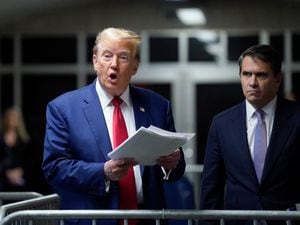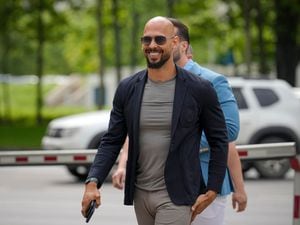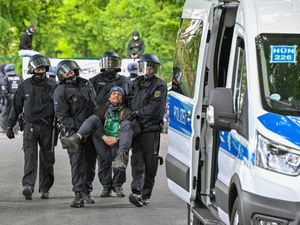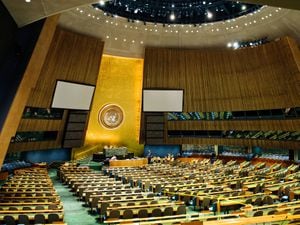Russia and Ukraine both optimistic ahead of fresh round of peace talks
Ukrainian president Volodymyr Zelensky said Moscow’s demands were becoming ‘more realistic’.

Both Russia and Ukraine projected optimism ahead of another scheduled round of talks on Wednesday, even as Moscow’s forces rained fire on Kyiv and other major cities in a bid to crush the resistance that has frustrated Kremlin hopes for a lightning victory.
Ukrainian president, Volodymyr Zelensky, meanwhile, went before the US Congress via video and, invoking Pearl Harbour and 9/11, pleaded with America for more weapons and tougher sanctions against Russia, saying: “We need you right now.”
With Moscow’s ground advance on the Ukrainian capital stalled, Russian foreign minister, Sergei Lavrov, said a neutral military status for Ukraine was being “seriously discussed” by the two sides, while Zelensky said Russia’s demands for ending the war were becoming “more realistic”.
Kyiv residents huddled in homes and shelters amid a citywide curfew that runs until Thursday morning, as Russia shelled areas in and around the city. A 12-storey apartment building in central Kyiv erupted in flames after being hit by shrapnel.

Russian forces also continued pounding Mariupol, the encircled southern seaport of 430,000 that has been under attack for almost all of the three-week war in a siege that has left people struggling for food, water, heat and medicine and has forced the digging of mass graves.
Hopes for diplomatic progress to end the war rose after Zelensky acknowledged in the most explicit terms yet on Tuesday that Ukraine’s goal of joining Nato is unlikely to be met. Russian President Vladimir Putin has long depicted Ukraine’s Nato aspirations as a threat to Russia.
Lavrov welcomed Zelensky’s comment and said “the business-like spirit” starting to surface in the talks “gives hope that we can agree on this issue”.
“A neutral status is being seriously discussed in connection with security guarantees,” Lavrov said on Russian channel RBK TV. “There are concrete formulations that in my view are close to being agreed.”
Russia’s chief negotiator, Vladimir Medinsky, said the sides were discussing a possible compromise idea for a future Ukraine with a smaller, non-aligned military.

Prospects of a diplomatic breakthrough were highly uncertain, however, given the gulf between Ukraine’s demand that the invading forces withdraw completely and Russia’s suspected aim of replacing Kyiv’s Westward-looking government with a pro-Moscow regime.
Ukrainian presidential adviser, Mykhailo Podolyak, denied Russian claims that Ukraine was open to adopting a model of neutrality comparable to Sweden or Austria. Podolyak said on Telegram that Ukraine needs powerful allies and “clearly defined security guarantees” to keep it safe.
Another source of dispute is the status of Crimea, which was seized and annexed by Russia in 2014, and the separatist-held Donbas region in eastern Ukraine, which Russia recognises as independent. Ukraine considers both part of its territory.
In going before Congress, Zelensky said that Russia “has turned the Ukrainian sky into a source of death for thousands of people.”
Appealing to President Joe Biden directly, he said that “being the leader of the world means to be the leader of peace”.
Biden has resisted Zelensky’s requests to send warplanes to Ukraine or establish a no-fly zone over the country because of the danger of triggering a direct war between the US and Russia.
The fighting has sent more than three million people fleeing the country, by the United Nations’ estimate. The UN reported that 726 civilians have been confirmed killed but that the real number is higher.

The head of the International Committee of the Red Cross, Peter Maurer, arrived in Ukraine to try to obtain greater access for aid groups and increased protection of civilians.
Amid the vast humanitarian crisis caused by the war, the Red Cross has helped evacuate civilians from besieged areas and has delivered 200 tonnes of aid, including medical supplies, blankets, water and more than 5,200 body bags to help “ensure the dead are treated in a dignified manner.”
Nowhere has suffered more than Mariupol, on the Sea of Azov. Local officials say missile strikes and shelling have killed more than 2,300 people.
Bodies have been buried in trenches, and more corpses lie in the streets and in a hospital basement. With humanitarian aid unable to get in amid the constant bombardment, people burn scraps of furniture to warm their hands and cook the little food still available.
An estimated 20,000 people managed to escape the city on Tuesday in 4,000 vehicles via a humanitarian corridor, according to Zelensky’s office.
But local authorities said Russian forces had taken hundreds of people hostage at a Mariupol hospital and were using it as a firing position. Officials said the troops forced about 400 people from nearby homes into the Regional Intensive Care Hospital and were using them and roughly 100 patients and staff as human shields.
Kyiv regional leader, Oleksiy Kuleba, said Russian forces had intensified fighting in the Kyiv suburbs and a highway leading west, and across the capital region, “kindergartens, museums, churches, residential blocks and engineering infrastructure are suffering from the endless firing”.
Ukraine also appeared to have successes, with satellite photos from Planet Labs PBC analysed by the Associated Press showing helicopters and vehicles ablaze at the Russian-held Kherson International Airport and Air Base after a suspected Ukrainian strike on Tuesday.
Meanwhile, the prime ministers of Poland, the Czech Republic and Slovenia returned to Poland after a risky visit by train to Kyiv to show support for Ukraine.
Czech Prime Minister Petr Fiala said massive supplies of military equipment must be delivered quickly by as many countries as possible.
“We have to realise that (the Ukrainians) do also fight for our independence, for our freedom,” Fiala said. “That’s the reason why we travelled there, to show them they’re not alone.”





